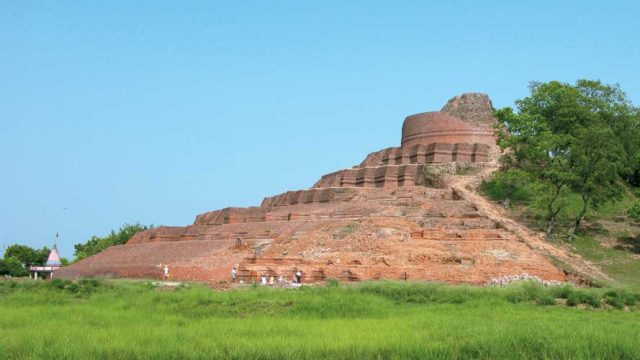Not many people know that the author of classics such as Animal Farm and 1984, George Orwell was born, in 1903, merely 160 km away from Patna, in the nondescript town of Motihari, where his father worked as a deputy in the opium department in British India. The house where he was born still exists. There is a plaque outside describing the significance of the place. Motihari also has the largest stupa in India and was the site of Mahatma Gandhi’s first satyagraha movement in 1917 to support the peasants who had revolted against the Colonial government’s policy of forced indigo cultivation and high taxes.
Motihari is the headquarters of East Champaran – a district that was created by partitioning Champaran in 1972. While for a few decades, this was one of the less popular and visited parts of the state, a greater focus on tourism has paid off. Sites like the Kesaria Stupa and the Rampurva pillars make this district a must-visit.

THINGS TO SEE AND DO
Other than the aforementioned Orwell House and the Gandhi Sangrahalaya, there isn’t much to see in Motihari itself. However, make the town your base when travelling to the many other sites in the district.
Gandhi Sangrahalaya
The Gandhi Sangrahalaya is a museum built to commemorate the Champaran Satyagraha, which Gandhi spearheaded in the region. It has some photos of and items used by Gandhi, including a walking stick and a pair of slippers. A 48-ft-long chunar stone pillar built by Nand Lal Bose was installed at the spot where Gandhi was produced before the court on 18 April 1917.
Kesaria Stupa
Discovered in 1998, the 104-ft-tall Kesaria stupa, locally known as ‘Raja Ben ka Deora’, is claimed to be the tallest stupa in the world, but it has been refuted since some stupas in Sri Lanka, namely Mirisawetiya, Abhayagiriya, and Ruwanweliseya, are larger. Nevertheless, Kesaria is foot higher than the Borobudur stupa, a World Heritage site on the island of Java, in Indonesia. The Archaeological Survey of India estimates that the stupa’s height was around 123 ft just before the earthquake of 1934 and 150 ft when it was originally built.

According to lore, the Licchavi dynasty built the stupa in the period before the Buddha attained nirvana. It is said that the Buddha spent a night here and made some important remarks, which were later incorporated into the Buddhist Jataka tales. The Chinese pilgrim Hiuen Tsang visited the stupa in the 7th century. Archaeologists have dated the current structure at around 200 CE with additions made to the stupa till about 750 CE.
Recent excavations have unearthed terraces with pradakshina path (circumambulatory paths) around the stupa, earthen lamps, decorated bricks and mud-and-pebble statues of the Buddha.
Someshwar Nath Mahadev Mandir
The Someshwar Nath Mahadev Mandir is a Shiva temple that attracts thousands of devotees, especially during the Hindu month of Shravan (July-August). It is located in Areraj, 28 km from Motihari.
Madhopur-Govind Village
There is an interesting story behind how Madhopur-Govind village got the name ‘Land of Peacocks’. During the 1960s, Shivkumar Singh and Chandrika Singh, a couple from the village, bought a peacock and a peahen from a nearby fair. Over time, the population of peacocks swelled to 500. This came to light when the District Magistrate of East Champaran asked locals to compile a list of places in the district that could be developed as tourist spots. The peacocks in Madhopur-Govind roam the fields freely and are protected by the villagers, who have even built a pond for them. The villagers feed the peacocks, which also eat snakes, thus making the fields safe to walk in.

Rampurva
Close to the Nepal border, in Gaunaha block of Narkatiaganj sub-division itself, lies the quiet town of Rampurva, the unexpected site of two Ashokan pillars unearthed in the late 19th and early 20th centuries. Both the pillars lie close to the Harbora River, flowing in from Nepal and notorious for flash floods in the monsoon, like many other streams in Champaran.
The Mauryan emperor Ashoka erected this stone column more commonly known as stambh dharma lekh. Dating back to 249 BCE, it is a 36.5-ft-high block of polished sandstone and has six of Ashoka’s edicts inscribed on it. The weight of the pillar above the earth is 34 tons, although the weight of the entire shaft is estimated to be 40 tons.
The edicts of Ashoka are divided into two parts – the northern has 18 lines and the southern 23 lines. The inscriptions contained edicts based on Buddhist tenets.
WHERE TO STAY AND EAT
There are plenty of hotels in Motihari, mostly cheap and simple. Choose from Hotel Sheetal Regency (Tel: 06252-2412401, 2500860, Cell: 09639236505; Tariff: ₹2,550-2,950); Hotel Divya Raj (Cell: 09430999988; Tariff: ₹750-2,250); Hotel Monika (Cell: 09430255419; Tariff: ₹630- 2,500); or Hotel Anamika (Tel: 240591; Tariff: ₹400-800). Room service is available at most of these.
For food, head to Elchiko Restaurant, Monalisa, or The Park. All serve Indian, Chinese and south- Indian dishes.
When to go October to March Location The headquarters of East Champaran district, Motihari is located 160 km N of Patna Air Nearest airport: Patna Rail Nearest rail: Bapudham Motihari
THE INFORMATION |
Tourist Offices Directorate of Tourism Frazer Road, Patna Tel: 0612-2332042, Tollfree: 1800 3456112 W bihartourism.gov.in |
BSTDC Beer Chand Patel Path, Patna Tel: 0612-2225411, 2506219 W bstdc.bih.nic.in Jehanabad |
Tourist Information Centre Bihar Tourism, Gaya Tel: 0631-2200672, Cell: 09471006727 STD code 06114 Rohtas |
BSTDC Shershah Vihar Faizalganj, Sasaram Tel: 06184-221267 STD code 06184 Kaimur |
BSTDC Kaimur Vihar, NH2, Mohania Tel: 06187-222822 STD code 06187 Motihari |
Tourist Information Centre Railway Station, Raxaul STD code 06252 Darbhanga |
Tourist Information Centre Railway Station, Muzaffarpur Cell: 07631347248 STD code 06272 |
THE INFORMATION |
Bhagalpur Tourist Information Centre Cell: 09801566828 STD code 0641 Munger |
Tourist Information Centre Fort Area, Munger Cell: 09801566828 STD code 06344 |




